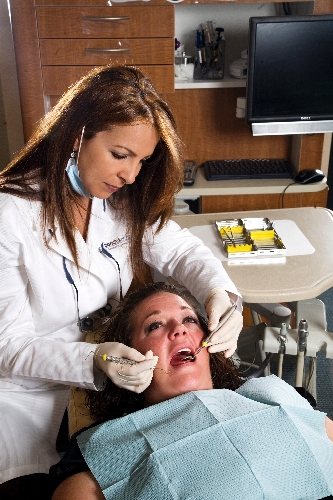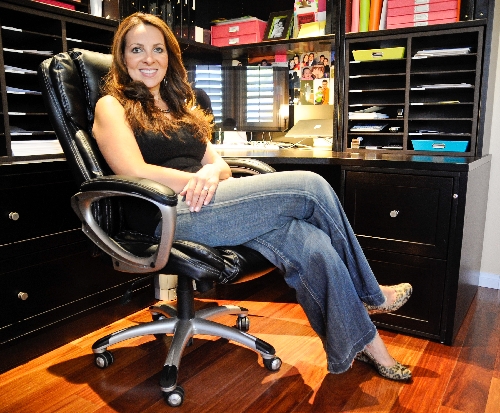Nonprofit offers dental care for breast cancer patients
What can cause damage to your teeth? Sugar, super-acidic foods and the side effects of chemotherapy.
That latter possibility caused Summerlin dentist Olya Banchik to establish the nonprofit organization Smiles for Survivors, which helps provide dental care for those diagnosed with breast cancer.
Her mother, Tatiana Gordin, was diagnosed in 2005 with stage III breast cancer.
"She went through chemo, two or three surgeries, radiation, everything," Banchik said. "My mom did not have severe oral consequences at the time of her treatments, but the way the foundation got started, after she got better and, knock on wood, she was doing OK, I wanted to give something back. ... I was going to offer a cosmetic makeover to a breast cancer survivor just to improve their smile, and then I sort of began seeing that they needed more than that, and that's how the foundation got started."
The effect of chemotherapy on teeth is not a widely studied phenomenon. But it is known that patients get something called xerostomia, commonly called dry mouth. When that happens, there's a significant diminishing of saliva, which carries good bacteria, the type that keeps plaque under control. As a result, patients can end up with serious dental decay.
"Another thing is, a lot of people, especially with the newer chemo drugs, they're so aggressive," Banchik said. "The way they work is they target cells that are actively multiplying ... like the GI (gastrointestinal) tract and the hair cells. And the same type of cell that's present in the GI tract is present in the (tumor). It's the same, basically."
Those undergoing chemotherapy can end up with debilitating mouth sores, sometimes so severe that they avoid eating and drinking. Cancer drugs can also cause one to regurgitate, which introduces strong stomach acids into the mouth.
"There's also the fact that these (people) are so devastated and depressed, their oral health is just not a priority," she said. "They're just fighting to stay alive, so oral hygiene is neglected."
Depending on the type of chemotherapy, inflammation of the mouth and a burning sensation can show up within a week of starting treatment, especially with the newer, more aggressive drugs such as Abraxane, Banchik said. Breast cancer patients can even lose their teeth.
"It's hard to say which came first, if the decay was the result of chemotherapy or if they already had tooth decay that was existing and it was exacerbated by the chemo or the lack of oral hygiene," she said. "In the end, we're seeing some gross destruction ... When they've been diagnosed with breast cancer, they don't see it coming."
The assistance from Smiles for Survivors can range from a value of $5,000 to $20,000 per patient, which is much appreciated by people who are already facing overwhelming medical bills.
When Raven Burroughs was diagnosed with breast cancer, she had no idea her teeth could be affected.
"Within almost weeks, I would go from a bit of decay to having a tooth break off at the gum," she said. "I had one break (while eating), and I got it out, and it was weird. It was almost spongy ... it was totally surprising. You'd think it would be hard, but it was like it had 'give' to it."
Smiles for Survivors gave her a complete set of dentures, including the cost of extracting all the teeth by an oral surgeon with sedation and fabricating the dentures. Burroughs, who was laid off while in treatment, said she could never have afforded it with all her medical expenses.
"If we can save their teeth (that's preferable)," Banchik said. "So we're talking root canals and crowns and maybe partial dentures, so that adds up. It's a lot of work, a lot of visits."
The foundation is in only its second year but is already growing, adding two other general dentists, a periodontist (gum and bone specialist) and an oral surgeon.
For more information, visit smilesforsurvivors.org.
Contact Summerlin/Summerlin South View reporter Jan Hogan at jhogan@viewnews.com or 387-2949.
Smiles for Survivors
For more information about the Smiles for Survivors nonprofit foundation, visit smilesforsurvivors.org.























